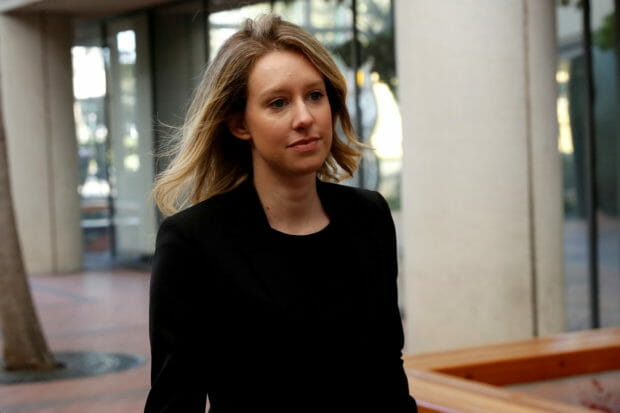
FILE PHOTO: Former Theranos CEO Elizabeth Holmes arrives for a hearing at a federal court in San Jose, California, U.S., July 17, 2019. REUTERS/Stephen Lam/File Photo
SAN JOSE, Calif. — Theranos founder Elizabeth Holmes testified on Monday that she believed the blood-testing startup could eventually develop technology for the battlefield but dismissed accusations she had touted its use by the U.S. military.
Holmes, 37, has pleaded not guilty to nine wire fraud counts and two conspiracy counts. She is accused of lying about Theranos, which had touted technology that supposedly could run diagnostic tests more quickly and accurately than traditional lab testing with a drop of blood from a finger prick.
Prosecutors have alleged that one of the ways Holmes misled investors was by leading them to believe Theranos devices were being used by the U.S. military in the field.
Testifying for a fourth day, Holmes said she did not believe she ever claimed that Theranos devices were being used on military medical evacuation helicopters.
Instead, Holmes said she had occasionally talked about military contracts but emphasized the company’s retail work.
Holmes also said she was disappointed the now defunct company was not able to deliver on a 2012 agreement with U.S. Central Command to create devices for testing at Bagram Air Base in Afghanistan, after spending tens of millions of dollars on the project.
“But I continued to believe that we would see it through,” she said.
Like other witnesses who have appeared over the course of the trial, Holmes testified from behind a clear partition without wearing a face mask.
Once valued at $9 billion, Theranos vaulted Holmes, a Stanford University dropout, to Silicon Valley stardom. Theranos collapsed after the Wall Street Journal published a series of articles starting in 2015 that suggested its devices were flawed and inaccurate. She was indicted in 2018.
Acting U.S. Attorney Stephanie Hinds was in the courtroom watching Holmes testify on Monday. Holmes’ cross examination is expected to begin in the afternoon.
Last week, Holmes denied lying to the Walgreens drugstore chain about her company’s technology, offering rationales for withholding important details about operations and internal reports.
Since the trial began in September, jurors in San Jose have heard evidence that prosecutors say proves Holmes defrauded investors between 2010 and 2015 and deceived patients once Theranos began making its tests commercially available, including through a partnership with Walgreens.
Prosecutors during opening statements said Holmes turned to fraud after pharmaceutical companies lost interest in the Theranos technology. Her attorneys told jurors that Holmes was simply a young, hardworking entrepreneur whose company failed.
Holmes has testified that she believed Theranos could have achieved its goal of a miniaturized device that would make diagnostic testing cheaper and more accessible, pointing to positive results from early work with drugmakers including Pfizer Inc.
She also said plans to place Theranos devices in Walgreens stores hit regulatory and logistical challenges.
During the trial, jurors also have heard testimony from more than two dozen prosecution witnesses, including patients and investors who prosecutors have said Holmes deceived.
Former Theranos Chief Operating Officer Ramesh “Sunny” Balwani, who also faces charges, is scheduled to be tried separately next year. Holmes testified briefly last week that Balwani, who has pleaded not guilty, prepared financial projections that were shared with investors.